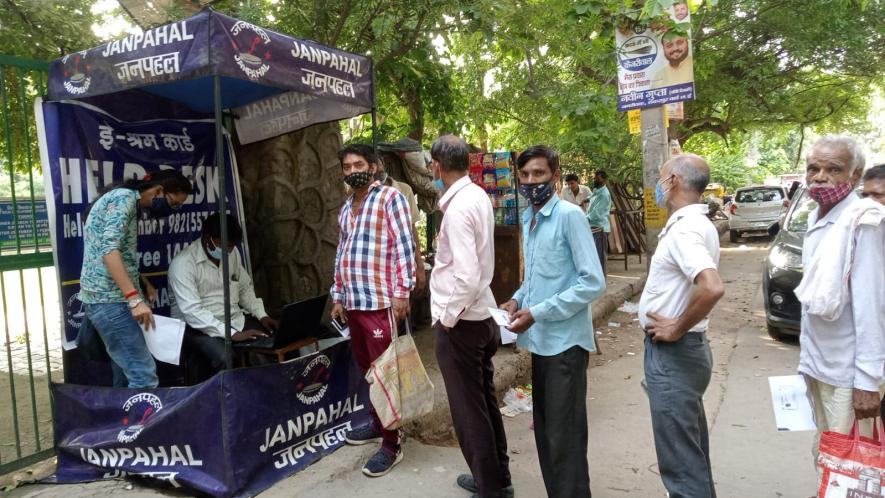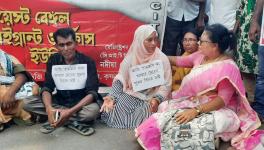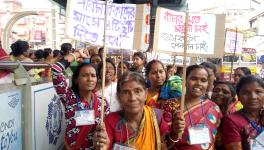‘Glitches’ in e-SHRAM Portal Mar Process of Registration of Informal Workers

A registration camp organised by Janpahal in the national capital. Image Courtesy - Special Arrangement
New Delhi: Over three weeks since the launch of the much-delayed national database for the informal labour force, the Centre has been patting its back over the “huge attention” that its registration portal – e-SHRAM-- has received. However, trade unions and workers’ groups say the exercise of registering workers in the huge unorganised sector is facing several issues along with some glitches in the portal.
As per a Labour Ministry press statement on Sunday, over one crore workers have registered themselves on the e-SHRAM portal since the launch of the National Database of Unorganised Workers (NDWU) on August 26.
Of these, 43% registered workers are female, and 57% are male, said the Ministry, adding that Bihar, Odisha, Uttar Pradesh and West Bengal were at the “forefront” with the maximum number of registrations till now.
However, the figures released by the Central government on Sunday do not take note of the difficulties faced by trade unions and other workers’ groups, which are assisting the informal sector workers, mainly migrants, in getting themselves registered to the e-SHRAM portal.
A major impediment in the process is the technological limitation of the digital portal to “handle large traffic” and the absence of certain occupational categories, most importantly, those of ‘home-based’ and ‘gig and platform’ workers, say trade unions.
The first week of the registration drive was “almost wasted” since the said portal server “remained down for most of the week”, said Dharmendra Kumar of Janpahal, a Delhi-based non-government organisation (NGO), which is helping workers in getting registered.
“Things started improving only in the second week, and the proper arrangements for registrations of workers even at the CSCs (Common Service Centres) – with biometric fingerprint scanners – were made by the end of it,” Kumar told NewsClick.
Workers can use the e-SHRAM’s mobile application or the website to register themselves. They can also visit the CSC, State Seva Kendra, Labour Facilitation Centres, select post offices of the Department of Posts’ Digital Seva Kendras, spread across the country.
In the national capital, among others, Janpahal has trained 180 volunteers – calling them the ‘Shram Sena’ – who are arranging camps in different parts of the city to facilitate registration of workers who do not have smartphones of knowledge about the entire process.
“There have been days when we have got almost 100 workers registered in just one camp but not even a single one on other days. This is because the portal, it seems, is not appropriately developed to handle large traffic,” Kumar said.
Similar concerns were shared by Lata of Self Employed Women’s Association (SEWA), Delhi unit, who is part of the women’s trade union to register the informal workers at its nine ‘SEWA Shakti Kendras’ in the city.
If the portal runs fine, the whole registration process does not take more than 10-15 minutes, Lata told NewsClick. However, the problem is when the portal doesn’t run, “and that is the case mostly on any given day,” said, adding that “this is very problematic, especially for unorganised workers since it is difficult to motivate them to wait to make a second registration attempt,” which may also mean loss of wages for some.
SEWA is currently focuses on getting domestic workers, street vendors, and home-based workers registered with the informal sector database in the national capital.
Another problem that the women’s union had to face is that there is no occupational category in the portal, such as ‘home-based worker’ under which registrations can be done with the e-SHRAM portal.
“Yes, there are specific categories like ‘tailors’ or ‘embroiderers’ and others but, overall, the database in this manner excludes a significant section of home-based workers that includes diverse forms of occupations,” she said.
Miles away from Telangana, Shaik Salauddin, had a complaint with regard to the registration process. According to him, no occupational category accommodates 'gig or platform workers' in the present NDWU module. Only categories such as 'motorcycle drivers' or 'car, taxi and van drivers' are available under the automobile and transportation section.
“Registration of gig and platform workers in this manner would hide the nuances of the prevailing labour arrangements in the gig economy. It is a matter of recognition of their work,” the national president of the Indian Federation of App-Based Transport Workers (IFAT) said, adding that he has raised this issue with the Labour Ministry’s officials in one of the public webinars conducted recently.
Another concern that most trade unions and organisations raised was the mandatory linking of the Aadhaar. “Most workers do not have their mobile phone numbers linked with their Aadhaar, hence, their Aadhaar is not getting authenticated,” said Kumar of Janpahal.
Though, workers, in this case, can visit a CSC where biometric fingerprint scanners can complete the authentication, “but that only limits the workers’ bodies like ours to get as many workers registered as possible,” he added.
Salauddin of IFAT also raised the issue of security of the workers’ data with the e-SHRAM portal. He said there was no assurance on safety of the workers’ data as yet by the Labour Ministry. This is a concern that has been raised by other labour experts too.
The press statement by the Labour Ministry on Sunday claimed that the most significant number of workers registered with the e-SHRAM portal were from agriculture and construction.
Vikram Singh of All India Agricultural Workers Union (AIAWU) said that the government’s own figures show that agricultural workers across the country have “welcomed” the registration initiative, but only creating a database is not enough.
“There must be a concrete proposal to ensure the social security of the agricultural workers. In the absence of it, the dataset on its own is of little use,” Singh said.
Siddheshwar Shukla of Rajdhani Bhawan Nirman Kamgar Union, a Centre of Indian Trade Unions (CITU) – affiliated construction workers’ body in Delhi, told NewsClick on Monday registrations on the e-SHRAM portal were currently being done at 20-odd camps of the union in the city. He said the construction workers’ union, in collaboration with other sectoral bodies affiliated to CITU, was planning to begin 25-35 more camps to register the different sections of unorganised workers.
“However, it is important to see what the government does with this data,” Shukla said. Asked what the union demands, he said the need of the hour is to “at least extend the 16 benefits” that the construction workers currently receive through their welfare boards to the unorganised working sections. These include medical assistance and paid maternity leave, among others.
“We are also demanding that the Central government extends its contributory pension schemes (like Pradhan Mantri Shram Yogi Maan-Dhan Pension Yojana) to the informal workers – but without making them pay for it. There must also be a quasi-judicial body to ensure minimum wages to the daily earners,” Shukla said, adding that “all this will collectively lead to a holistic approach in ensuring social security to the unorganised workers.”
The Narendra Modi government claims that national database will be used to integrate the numerous social security schemes for the unorganised workers. In this line, the Labour Ministry has targeted to complete the registration of 380 million informal workers across the country by the end of this year – though, this was only after drawing flak from the Supreme Court earlier this year in July for showing “unpardonable apathy” in putting the said portal for registration of migrant labour into operation.
However, there are not many such incentives for workers as of now. Along with being provided with an “e-SHRAM” card, which carries a unique 12-digit number, every registered worker with the portal is only entitled to receive, under an accidental insurance cover, Rs 1 lakh on partial disability and Rs 2 lakh on permanent disability or death.
Get the latest reports & analysis with people's perspective on Protests, movements & deep analytical videos, discussions of the current affairs in your Telegram app. Subscribe to NewsClick's Telegram channel & get Real-Time updates on stories, as they get published on our website.
























